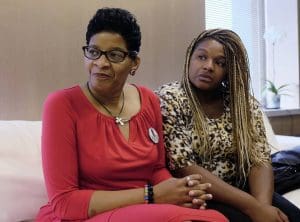Sandra Bland's family is fighting for law enforcement reforms that could have saved her life
“I need you all to really think about what you have the ability and the power to do today.” Two years after the tragic death of her daughter, Sandra Bland, Geneva Reed-Veal returned to the state that many believe is responsible for taking her child’s life. Reed-Veal faced the Texas Legislature this week as a […]

Two years after the tragic death of her daughter, Sandra Bland, Geneva Reed-Veal returned to the state that many believe is responsible for taking her child’s life. Reed-Veal faced the Texas Legislature this week as a grieving mother, tearfully appealing to the assembled lawmakers to reform the system that contributed to her daughter’s senseless imprisonment and untimely demise after a minor traffic offense.
“While today I can only stand up for my daughter, because that is my duty … allow me to be able to stand with you and say, ‘We made change.'”
The change she seeks is the Sandra Bland Act, introduced by Rep. Garnet Coleman (D-Houston) to improve policing and jail standards and provide additional training to law enforcement officers in de-escalation tactics and handling people with mental health issues, among other measures. The bill is intended to instill greater fairness, and to prevent profiling and the unreasonable escalation of force against citizens like Bland, who found herself slammed on the ground, handcuffed, threatened with a taser, and imprisoned after merely failing to signal before changing lanes.
And, as has happened far too often in encounters between unarmed Black people and law enforcement, Bland later died in custody. Her death was ruled a suicide, but the air of mystery around it has never fully cleared.
A couple of months before Bland’s death, I was pulled over by a Texas state trooper on a remote stretch of West Texas highway for a minor traffic infraction. I was engrossed in conversation with my childhood friend during our cross-country trip from California to our Dallas hometown, and did not notice a change in the speed limit as we entered a small town. My hands never left the steering wheel and both my manners and my latent Texan accent kicked in: “Yes, sir … I’m sorry, sir.” The trooper asked us a lot of questions, but he remained courteous and sent us on our way with just a warning.
But the memory of so many Black lives lost during routine encounters with the police led my teenage daughter to wonder if he would have been so nice to us if we did not have a white lady in the car with us. I did not desire to demonize police in the way in which so many of our people are demonized by those who call us “anti-police,” for just wanting to stay alive and be treated fairly. But I had no answer for her.
The Sandra Bland Act is a first step at addressing these fears and inequities, and bridging gaps between law enforcement and the communities they serve. In the words of Bland’s mother: “This is not about anti-police … I don’t hate police. I hate the fact that we do not understand that this is going on too long by those who have been charged to serve and protect us.”
Some law enforcement groups, legislators from both sides of the aisle, and the Texas Public Policy Foundation, a powerful conservative lobby, have expressed support for certain aspects of the bill, primarily the provisions for additional training resources for officers and jailers, and the proposed grants to smaller communities to help them comply with the bill’s standards.
But the bill still faces an uphill battle to pass the Texas legislature. Even groups like the Texas Municipal Police Association and Combined Law Enforcement Associations of Texas, which have worked with Coleman to craft mutually acceptable compromises, still object to the bill because of the “tone” that “law enforcement is run amok,” and disagreement over diverting inmates with mental disabilities out of jails and “pretext stops,” in which officers stop individuals for minor traffic offenses with the purpose of investigating and interrogating them for other potential violations of law. Though the bill was allowed a hearing with multiple witnesses testifying regarding its merits, including Reed-Veal, it is still pending in committee.
But Sandra Bland’s mother has not given up hope, or her determination to fight for change. Following Tuesday’s hearing, she remarked:
I feel like people heard what I was saying. Not so much so that Sandra was a number, but her mom was here. Her family is here. Her death, the loss of her, has had a domino effect throughout our community. So we’re still grieving, but I still have to get up and keep moving.
I don’t care how long it takes. I don’t care what anybody else says or does. I will be on the scene when there is anything moving on this bill.
Recommended

New NC GOP chair flirts with bogus stolen election conspiracies
Simmons predecessor was a staunch 2020 election denier
By Jesse Valentine - April 19, 2024
Texas activists pushed abortion restrictions in NM cities and counties, records show
Emails reveal influence and control in exchange for promises of legal help
By Austin Fisher, Source NM - March 04, 2024
Cannabis workers across Missouri begin push to unionize dispensaries
The first day was a breeze. Sean Shannon and Danny Foster walked into several marijuana dispensaries around Missouri with their matching “Union For Cannabis Workers” shirts and talked to employees about the possibility of unionizing. “The first day, there were 57 stops amongst the teams,” said Shannon, lead organizer with UFCW Local 655, which actually […]
By Rebecca Rivas - December 04, 2023










































































